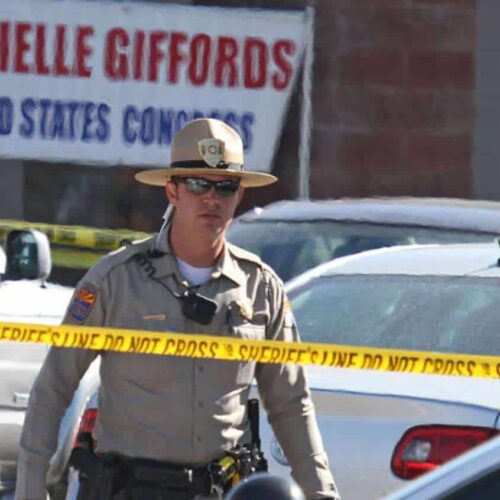Introduction
The months-long pattern of bizarre behavior by alleged Tucson shooter Jared Lee Loughner has once again raised questions about what sort of mental health problems should bar the purchase of a firearm, and how such issues should be flagged for law enforcement or treatment officials.
Loughner is accused of a shooting spree last Saturday in Tucson that killed six people and wounded 14, including Democratic Rep. Gabrielle Giffords, who was hosting a public meeting with constituents. Loughner, 22, was suspended last year from Pima Community College following a series of widely reported outbursts in a mathematics class. College officials told him he could not return until he obtained a mental health clearance that demonstrated he was not a danger to himself or to others.
Campus police were involved in that process, but apparently did not notify other law enforcement authorities or local mental health officials. Information obtained by the National Alliance on Mental Illness shows Arizona’s Pima County mental health system had no records of Loughner’s illness.
Loughner’s classroom behavior fell far short of disqualifying him from buying a firearm, but in the aftermath of the shooting, some are asking whether it’s time to broaden the indicators of mental health problems that allow denial of a firearm application.
Federal law theoretically bans some people with mental illnesses from purchasing handguns, but the bar is high: denial is allowed only for an applicant who has been determined mentally unstable by a court or has been involuntarily committed to a mental health facility. Because Loughner fit into neither of these restrictions, he broke no laws when he passed a background check and purchased a 9-mm Glock 19 semi-automatic handgun that prosecutors say he used in the attack. Such background checks have been mandated since then-President Bill Clinton signed the Brady Law in 1993.
“The current federal categories are very narrow,” said Dennis Henigan, chief lawyer for the Brady Campaign to Prevent Gun Violence. “This may call for a reassessment of the circumstances under which someone should be denied a gun under the law.”
The National Rifle Association declined to address the issue of mental health restrictions on gun owners. “At this time, anything other than prayers for the victims and their families would be inappropriate,” NRA spokeswoman Rachel Parsons said.
Another issue is that many state records on involuntary commitments or rulings of mental instability have never found their way into the federal background check system.
This issue came into sharp focus after the 2007 Virginia Tech massacre, when it was revealed that the shooter, Seung-Hui Cho, had essentially purchased his gun illegally. Cho fatally shot 32 students and faculty on campus, before killing himself, according to authorities. A Virginia court had recognized Cho as mentally unstable, but the state failed to submit the records to the federal system, leaving his record clear and allowing him to pass a background check and purchase two handguns.
A push to address this loophole drew rare agreement from gun control advocates and the NRA. In 2008, then-President George W. Bush signed an amendment to the Brady law that offers incentives to — but does not require — states to report high-risk buyers with documented mental health problems to the federal government. It aimed to increase the number of people that were banned from purchasing firearms due to mental instability.
Just one day before the Tucson congresswoman was shot, the Brady Campaign to Prevent Gun Violence issued a press release detailing how the 2008 amendment had more than doubled the number of disqualifying mental illness records submitted from states and territories to the federal background check system. The number of records jumped to 929,254 records in summer 2010, up from 402,047 in January 2008, it said.
Since the Virginia Tech shootings, the release said, a dozen states have passed legislation to improve their reporting. Maryland Gov. Martin O’Malley and then-Virginia Gov. Tim Kaine, both Democrats, signed executive orders to improve record submission, and six other states submitted a massive number of records in either 2007 or 2008. Since 2009, at least nine states have received grants that were part of the act to improve their performance in reporting disqualifying mental illness information.
“But the evidence is that there are still a lot of prohibited buyers,” said Henigan from the Brady Campaign. The Brady Campaign statement said that many records are still missing, noting that authorities estimate at least some 2 million mental health records should be in the system.
Arizona reported 121,700 banned buyers from 1989 through 2008, but the narrow federal definitions regarding mental health restrictions would have excluded Loughner from the list in subsequent reports. And Pima Community College was under no affirmative legal requirement to submit records of his mental health instability to federal law enforcement officials or anyone else.
“That was the one opportunity to get him plugged into services, but they certainly have no legal obligation under federal law to refer him to the mental health system,” said Ron Honberg, director of policy and legal affairs for the National Alliance on Mental Illness (NAMI). “There are also disincentives for referral because of the [federal Family Educational Rights and Privacy Act] — a law that sets forth privacy for students,” he said.
Virginia attorney Stephen P. Halbrook, a frequent defender of gun owners’ rights, asserted that psychiatrists “don’t want these records to be public because they don’t want people to keep from getting treatment.”
In some countries, such as England, Halbrook said, an independent referee must provide a character statement that in part addresses the applicant’s mental state. He doesn’t think the United States should enact a similar measure, but added: “I wish we had more ways of finding out about people who are dangerous.”

Join the conversation
Show Comments